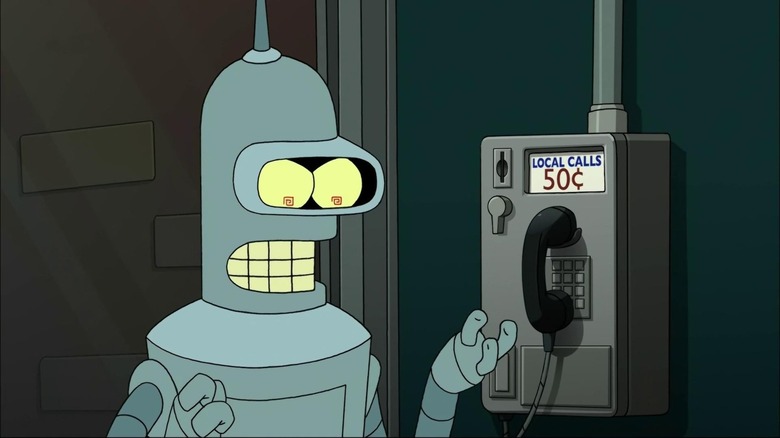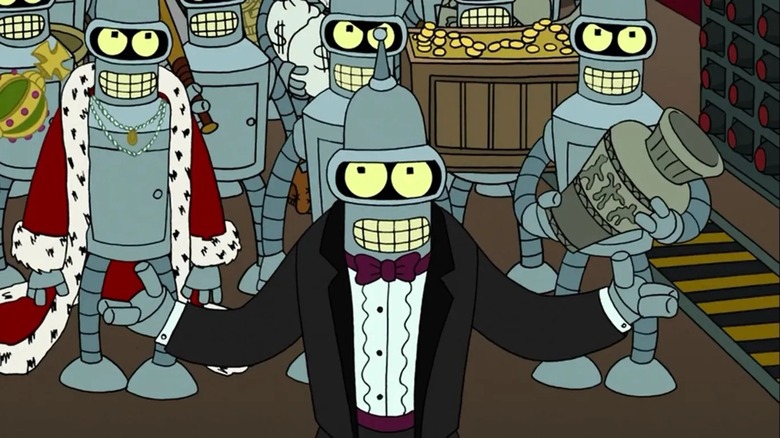An Early Futurama Idea Would Have Made Bender's Speech A Lot Different
Bender (John DiMaggio), the drunken alcoholic robot on Matt Groening and David X. Cohen's sci-fi sitcom "Futurama" is fueled by alcohol. Indeed, if Bender doesn't have a cocktail once or twice a day, he begins to rust, his batteries begin to run down, and he behaves as if he's drunk. Of course, consuming too much booze also makes Bender behave like he's drunk, so it's a careful balance to ensure he's functional. If that seems unclear, don't worry. The characters on "Futurama" don't quite have a grasp of it either. When Bender claims to have seen a werewolf car (!), Fry (Billy West) responds by saying "You've been drinking too much, or too little. I forget how it works with you. Anyway, you haven't drunk exactly the right amount."
Early in the series, Bender had more of a "drunken" voice, with actor DiMaggio giving the character a slightly raspier effect as well as a slight, drunken slur. As the series progressed, DiMaggio's voice became less "wino" and more "noisy guy at a bar," with Bender shouting and expressing more tipsy self-enthusiasm.
Bender's mouth appears to be a speaker, and when he speaks, the lines in his robotic "teeth" kind of pulsate and move as if they're lips. It's not quite the same as lip-synching, but it's a fun robotic equivalent. On the DVD commentary track for "Space Pilot 3000," the pilot episode of "Futurama," Cohen, Groening, and the episode's directors, Gregg Vanzo and Rich Moore, talk about early designs for Bender, and reveal that the "robot lips" wasn't always their plan. In early animation tests, Bender had a mere light-up mouth
The light-up mouth
Cohen asked Moore and Vanzo what the animation challenges were for Bender's moving mouth, and Moore recalled the early mouth design. "We tried doing a test," Moore said, "where his mouth just lit up when he talked to the syllables." Groening wondered why that design was abandoned, asking if it merely didn't look good. Cohen pointed out that a light-up mouth is indeed less aggressive. A viewer might note that many of the robots on "Futurama" do indeed have light-up mouth panels, while only a few have quivering "speaker" mouths like Bender.
Seeing as Bender is shaped like a large, metallic can, sports an old-fashioned antenna, and can only turn his head left and right, this author pictures him to be made of old-fashioned materials. He's a conscious robot capable of amazing strength, but could still be assembled in a garage on the weekends, provided one had the tools and the wherewithal. As such, Bender's mouth isn't so much a high-tech TV screen with lines on it so much as it is a 1970s stereo speaker. Likewise, his eyeballs are fragile like light bulbs, and his body is a mere plate of not-at-all-lightweight steel.
Of course, the actual technological functioning of Bender is not important to "Futurama." This isn't "Star Trek," which feels the need to explain its technology using delicious multisyllabic word salads. "Futurama" is a comedy. Bender is a robot. He drinks too much booze and is a kleptomaniac. If it's funny, then it's game. How his mouth works is more an animation concern than a matter of robotics.

